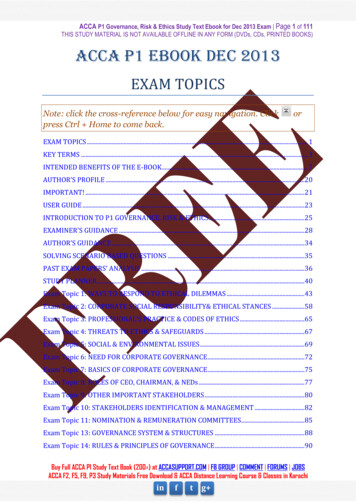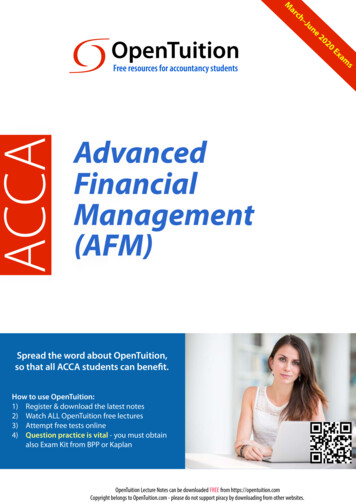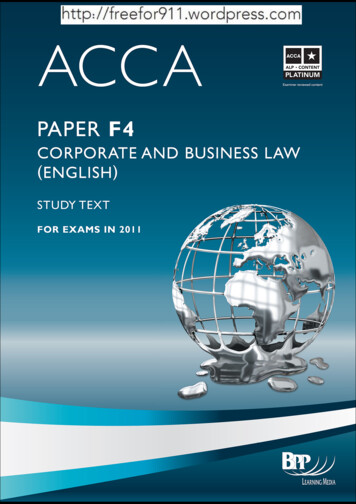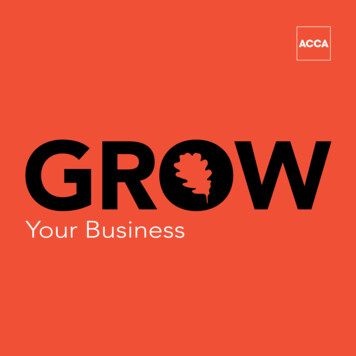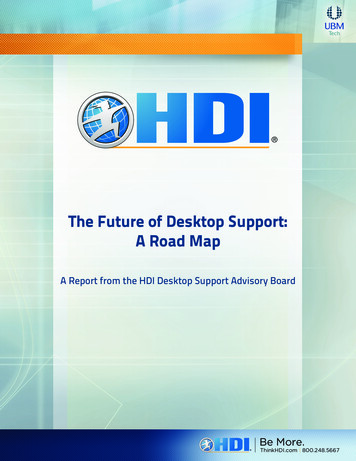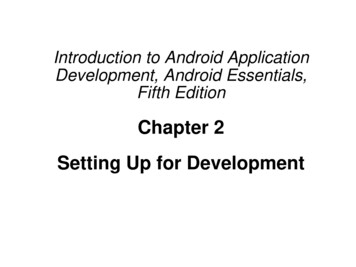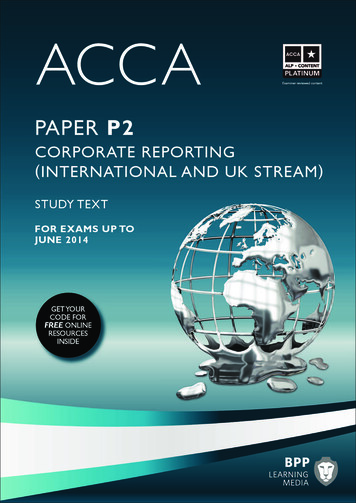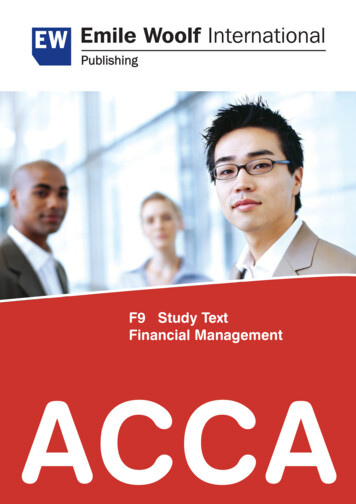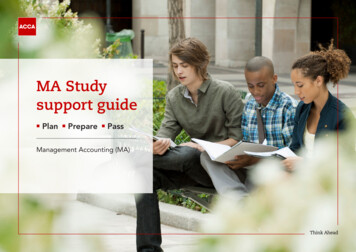
Transcription
MA Studysupport guidenPlannPreparenPassManagement Accounting (MA)
PlannPreparenGETTINGSTARTEDnPassLEARNINGPHASE Signposted resources and how to use them Interactive clickable checklists to keep you on track03Learning phase 10Revision phase 15Final preparation 19The exam 21Appendix – Links 23THE EXAM Tips for success to help you through your studiesGetting started Stages ofstudy Structured approach to show you how to succeedSectionsFINALPREPARATIONWhy use this guide?REVISIONPHASEWelcome to your guide helping youto study for your ManagementAccounting examThis guide is applicable for exams from September 2018to August 2019.APPENDIX– LINKS02
GETTINGSTARTEDEnter for your examDraw up your study planGet to know your examREVISIONPHASE Buy an Approved ContentProvider study text and question& answer bankLEARNINGPHASEYour checklistFINALPREPARATIONTHE EXAM03APPENDIX– LINKSGetting started
GETTINGSTARTEDGetting started – Tips for success- the most up to date content and syllabus coverage- tests, quizzes and other support designed to help youprepare for your exam Remember to personaliseyour edition of StudentAccountant so you receiveMA specific information asyou need it. If you think you could benefitfrom building your Englishlanguage skills to help yousucceed in your exam takea look at the BPP EnglishLanguage support forACCA which is a free onlineprogramme specificallydesigned to support youthrough your exams.THE EXAMStudents who use approvedcontent materials are morelikely to pass than thosewho don’t. Use the ACCA LearningCommunity to link up withfellow students around theworld studying the sameexam as you – get tips, joindiscussions and share ideasand advice. You can alsoaccess live Q&A sessionsand presentations. Spend some timefamiliarising yourself withthe free resources availablevia the exam resource finderon the student section ofthe ACCA website – we willprovide you with specificguidance on when and howto use these resources duringthe relevant stages of study.FINALPREPARATIONYou may want to consider attending a face to face oronline tuition course with one of ACCA’s ApprovedLearning Partners for all or part of your studies orsigning up for ACCA-X for all or part of your learning. In most places you can nowtake MA by our flexibleon‑demand CBEs. Searchfor a local on‑demand CBEcentre using our centre listand contact them directly tobook your exam on a datethat suits you.REVISIONPHASE- past exam questions updated for changes to thesyllabus, question style and exam format as well aspractice questions and answers and full mock examsto ensure you are fully prepared for your examTips for successLEARNINGPHASEWe strongly recommend that you buy an MA ApprovedContent Provider Study Text and Question and AnswerBank to ensure exam success. These provide:APPENDIX– LINKS04
GETTINGSTARTEDGetting started – Draw up your study planWednesdayThursdayFridaySaturdaySundayWeek yWeek yWeek yWeek yWeek yWeek yWeek yWeek yREVISIONWeek 10REVISIONWeek 11REVISIONWeek 12REVSION AND FINAL PREPARATIONEvening study periodDaytime study periodOther commitments Block out days/half days/evenings already committed tofamily/social events Plan study periods – evenings/half days/full days, aiming forroughly one evening/half dayper chapter of your study text If possible leave a four weekperiod for the revision andfinal preparation phasesTHE EXAMWeek 9 You may need to add or takeaway weeks depending on yourown onday Calculate the number of weeksfrom now until your examdate and draw up a plan – seethe example to the left and apossible proforma for you touse on page 7LEARNINGPHASEStudy plan checklistAPPENDIX– LINKS05
GETTINGSTARTEDGetting started – Draw up your study planLEARNINGPHASETips for successWhen drawing up your study plan Once you have prepared your plan stick to it! Consider building in an extra study period after everyfew chapters to review and consolidate your learning. Use this plan whether you intend to self-study throughall the phases or mix with some tuition from anApproved Learning Partner.FINALPREPARATION Take a 5 – 10 minute break every hour to help maintainyour motivation and concentration.Students who use ACCA’slearning support resourcesachieve higher pass ratesthan those who don’t.REVISIONPHASE Be realistic and consider when you are best able tostudy – maybe early mornings work better for youor perhaps shorter study periods more often.THE EXAMAPPENDIX– LINKS06
GETTINGSTARTEDGetting started – Your study planPrint out and write down when you will study, relax and yWeek 1LEARNINGPHASEMondayWeek 2REVISIONPHASEWeek 3Week 4Week 5FINALPREPARATIONWeek 6Week 7Week 8REVISIONWeek 10REVISIONWeek 11REVISIONWeek 12REVISION AND FINAL PREPARATION07Daytime study periodOther commitmentsColour boxes in your preferred highlighter colours.APPENDIX– LINKSEvening study periodTHE EXAMWeek 9
gives you an understanding of the aims and objectives of the exam, learning Thisoutcomes and exam structure Scan the MA specimen examspecimen exam provides you with a clear picture of how MA will be assessed and Thehow the exam is structured as well as the likely style and range of questions that youLEARNINGPHASE Review the syllabusand study guideGETTINGSTARTEDGetting started – Get to know your examcould see in the real examprovide feedback on students’ performance after each exam session, highlight Theseproblem areas that students need to improve on and tell you what the examiningteams are looking for; these are critical to your success in passing MA – and takea quick look at MA – A guide to using the examiner’s reports for an overview ofsome of the most common challenges students facethis video for pointers to some of the key skills you will need to pass MA as well Viewas more information about the exam structure and exam technique Scan the exam techniqueand syllabus updates articlesarticles here cover answering multiple-choice questions, computer-based exam Thetechnique and how to prepare for knowledge modules exams – you will need to Familiarise yourself with theformulae sheetwill be provided with this document in the exam and so you will not need to learn Youthese formulaecome back to these during the revision phase but they will provide you with guidancethat will be helpful in attempting questions throughout the learning phaseAPPENDIX– LINKS View the study support videoMA/FMA MTQ adviceTHE EXAM08and tips as well as pitfalls to avoid – see extracts from the examiner‘s approach articleover the pageFINALPREPARATION Review the examiner’s reportsfrom the last four sittingsthese resources at the start of your studies will help you understand the focus Usingof the exam by concentrating on the exam structure, question style, exam techniqueREVISIONPHASE Review the examining team’sguidance
Comments onmulti taskquestions (MTQs):Syllabus area C –BudgetingSyllabus area D –Standard costingMarkingThere are no negative marks. The worst a candidate canbe awarded is zero. Therefore, they should not leave anyanswers incomplete. If candidates cannot think of thecorrect answer, guessing becomes a sensible alternative.Units of measurementIt is important that candidates present their answersexactly as requested, otherwise the answer will bemarked incorrect.Example: assume the correct answer is 57,150,000.Because the question asks for the answer in 000 it mustbe entered as 57150. If you put 57150000 it would bemarked as incorrect.RoundingSensible rounding is acceptable. When appropriate(e.g. when using annuity tables, the present value table,or the annuity formula result in slight variations in theanswer) the computer will allow a range of answers.09APPENDIX– LINKSThe most common approach on rounding is to 'roundhalf up' – that is, halfway values and above are alwaysrounded up. For example, by this rule the value 23.5gets rounded to 24, but 23.5 gets rounded to 23.This approach is adopted in ACCA questionsTHE EXAMMTQs are made up of a setof background data and anumber of tasks. Most taskswill require reference to thebackground data, but somewill not.The ACCA websitecontains specimen papersand extra MTQ practicequestions for the CBEfor MA/FMA, as well asshowcases explaining allof the functionality of theCBE exams. There is alsoa specimen of the newformat paper-based exam.It is strongly recommendedthat you should workthrough these questions aspart of your preparation thereal exams.Comments onmarking and rounding:FINALPREPARATIONSyllabus area E –Performance measurementAdvice tocandidates:§REVISIONPHASEThere will be three MTQs inSection B of the paper, oneeach on the following ng started – Understanding the structure of the MA exam(extracts from the examiner’s guidance – structure of exam)
GETTINGSTARTED- gain the knowledge youneed; andFINALPREPARATION- learn how to apply thatknowledge to pass theexamREVISIONPHASE Work through the controlsheet which has beendesigned to give you astructured approach to yourlearning phase to ensure you:LEARNINGPHASEYour checklistTHE EXAM10APPENDIX– LINKSLearning phase
BPP Learning Media – page 13 Kaplan Publishing – page 14 Read through the introduction tothe chapter Noted any additional commentaryand exam focus tips provided Worked through and understoodexamples and illustrations ofconcepts givenTick the box Questions in the controlsheet once you have: Attempted the questions referred to inthe Question Bank (if you are using BPPmaterials) or the practice questions atthe end of the text (if you are usingKaplan materials)Tick the box ACCA related resourcesin the control sheet once you have: Note that ACCA produces new articlesand videos throughout the year and so youshould always check the technical articlespage on the website to ensure you haveseen all of the related resourcesTHE EXAM Read / viewed the related ACCAarticle(s) / video(s) signpostedFINALPREPARATION Actively read and understood eachchapter’s content Attempted the quiz at the end of thechapter (if you are using BPP material) orthe test your understanding questionsthroughout the chapter (if you are usingKaplan material)REVISIONPHASETick the box Content in the controlsheet once you have:Tick the box Quiz/Test in the controlsheet once you have:LEARNINGPHASEStudents who useACCA’s learningsupport resourcesachieve higherexam scores thanthose who don’t.Use the control sheet relevant tothe Approved Content Provider’smaterials you have purchased:GETTINGSTARTEDLearning phase – Get the most out of your control sheetAPPENDIX– LINKS11
GETTINGSTARTEDLearning phase – Tips for success If you find you are not coveringall of the material in each studyperiod, build some extra timeinto your study plan – everyoneworks at a different pace. Keep an eye on StudentAccountant for anyrelevant articles. There are PER (PracticalExperience Requirement)objectives associated withspecific syllabus areas and,if possible, you should tryto gain experience in thesealongside your studying asthis will help you to put yourstudies into a workplacecontext and reinforce whatyou have learned. Try to read a goodquality business journalor newspaper regularlyand use this to help bringyour studies to life bylinking your learning intowhat you are reading.THE EXAM Consider using the additionalresources provided by theApproved Content Providersincluding for examplepasscards or pocket notesto help you remember thekey knowledge areas. Make sure you use theACCA resources to helpyour understanding – thesegive you real insight to helpyou in your exam. Visit the ACCA LearningCommunity regularly toview new video content andto join online study events.FINALPREPARATION Scan headings before goinginto the detail to give youan idea of the content firstand consider highlighting,underlining, making notes,drawing pictures or mindmaps – whatever helpsyou to remember. Always work through thequestions signposted – itis vital that you practisequestions throughout thelearning phase as this willensure that you are applyingthe knowledge you learnas you progress.REVISIONPHASE Actively read the material –ask yourself ‘do I understandthis?’ If not re-read andre‑work examples – if youstill struggle, make a noteand come back to it.LEARNINGPHASETips for successAPPENDIX– LINKS12
ChapterContentQuiz/TestGETTINGSTARTEDLearning phase – Control sheet for BPP Learning MediaQuestions ACCA related resourcesIntroduction1Accounting for management2aSources of data2bPresenting information3aCost classification3bCost behaviour4Forecasting5Accounting for materials Inventory control6Accounting for labour Study support video – Accounting for labour7aAccounting for overheads Fixed overhead absorption7bAbsorption and marginal costing8aProcess costing8bProcess costing, joint products and by-products9aJob, batch and service costing9bAlternative costing principlesLEARNINGPHASE tick the boxes below when complete Effective presentation and communicationof information using chartsFINALPREPARATION Re-apportionment of service cost centre costsREVISIONPHASE Process costing10a Budgeting10b The budgetary process Cash budgetsMaking budgets workTHE EXAM1112a Capital expenditure budgeting12b Methods of project appraisal13Standard costing14a Cost variances Fixed overhead absorption14b Sales variances and operating statementsTarget setting16Financial performance measurement17Assessing non-financial performance13When watching the study support video, focus at this stage on the technical aspects – you will watch it againduring the revision phase and at that point you will be able to focus more on the exam technique aspects Ratio analysisAPPENDIX– LINKS15
ChapterContentQuiz/TestGETTINGSTARTEDLearning phase – Control sheet for Kaplan PublishingQuestions ACCA related resourcesIntroduction1Accounting for management2Sources of data3Presenting information4Cost classification5Accounting for materials Inventory control6Accounting for labour Study support video – Accounting for labour7Accounting for overheads Fixed overhead absorption Re-apportionment of service cost centre costs8Absorption and marginal costing9Job, batch and process costing Effective presentation and communication ofinformation using chartsREVISIONPHASE Process costing11 Alternative costing principles12 Statistical techniques Cash budgets14 Capital budgetingFINALPREPARATION10 Service and operation costing13 BudgetingLEARNINGPHASE tick the boxes below when complete15 Standard costing16 Performance measurementTHE EXAM17 Spreadsheets Ratio analysisAPPENDIX– LINKS14When watching the study support video, focus at this stage on the technical aspects – you will watch it againduring the revision phase and at that point you will be able to focus more on the exam technique aspects
GETTINGSTARTED Revisit areas you struggled withduring the learning phase Make sure you are able to applythat knowledge in questionsREVISIONPHASE Ensure you are confident withthe knowledge needed to passthe examLEARNINGPHASEYour checklistFINALPREPARATIONTHE EXAMAPPENDIX– LINKSRevision phase
GETTINGSTARTEDRevision phase – Question practice To keep motivation high,break some questions intoindividual parts, write plansor notes for some partsand do others in full. Don’t be afraid to attemptquestions you have alreadydone – especially the onesyou found tricky first timeround. Work through the answerscarefully – pay attention toareas you got wrong andunderstand where you wentwrong – it is better to doa few questions well thanlots of questions badly. Try not to look at theanswers before reallyattempting the question– you won’t be able todo this in the real exam!THE EXAM It is really important thatyou do some questions infull, to exam time – timemanagement is often anissue and the more youprepare yourself thebetter you will performin the exam.FINALPREPARATION Work through the specimenexam – this will provide you witha clear picture of what the examwill look like making sure youknow what to expect on the day Consider blocking timein your study plan forspecific questions or mockexams to ensure you covereverything.REVISIONPHASE ork through as many questionsWas possible and all mock examsincluded in the ApprovedContent Provider question andanswer banks – remember theseare best for question practiceas they include past examquestions updated for syllabusand format changesTips for successLEARNINGPHASE Exam-standard question practiceis vital nowAPPENDIX– LINKS16
GETTINGSTARTEDRevision phase – Key resources17 Don’t miss the specimen exam – this is a full example of theexam and replicates the exam environment – attempt in fullto time. Think about purchasing a Practice Test – practice makesperfect and, even better, you get personalised feedbackdiagrams highlighting your strengths and weaknesses, so youcan refine your revision. See the Practice tests video on thestudent section of the website for more information on howuseful these can be for your revision.APPENDIX– LINKS Make sure you read the study skills articlesin Student Accountant covering topics suchas how to overcome exam anxiety as well aschecking the Student Accountant Hub forany new technical articles related to MA Don’t give up easily – if you really cannot understandsomething then consider posting a question on the ACCALearning Community – if you found it difficult so will others.THE EXAM Read the exam technique and syllabusupdates articles – this time linking intowhat you have learntTips for successFINALPREPARATION View the study support video referred to inyour control sheet again as well as the videoMA/FMA MTQ – this time focussing onexam techniqueStudents who use 5 minuteswith the examining teamvideos are more likely topass than those who don’t.REVISIONPHASE Remind yourself of areas that students oftenstruggle with and obtain tips on how toensure you do not make the same mistakesby reviewing the examiner’s reports fromthe last four sittings again, this time workingthrough the MA – A guide to using theexaminer’s reports to really benefitfrom the valuable advice providedLEARNINGPHASE Review the examining team’s guidanceagain in the context of what you have learnt
Comments onsection B:Students who use examiners’reports are more likely to passthan those who don’t.REVISIONPHASESection B contains 3 questions, one from each of syllabus areas CBudgeting, D Standard Costing and E Performance Measurement.This approach will continue in future exams. The balance of MCQquestions in section A reflects this weighting so as to preserve theoverall balance of the exam.LEARNINGPHASE§GETTINGSTARTEDRevision phase – What the examiner has said about MA(extract from the December 2017 examiner’s report)Common problems with section B questions include the following An inability to calculate payback, NPV and IRR. An inability to calculate residual income and ROCE. An apparent difficulty with questions presented inspreadsheet format A difficulty with questions involving the reconciliation ofactual and budgeted figures via standard costing variances.THE EXAMStudents who use ACCA’slearning support resourcesachieve higher exam scoresthan those who don’t.FINALPREPARATION An inability to calculate standard cost variances.APPENDIX– LINKS18
GETTINGSTARTED You are clear on the knowledgeyou need to pass the examas well as how to apply thatknowledge the exam formatFINALPREPARATIONPREPERATIONEnsure you arefamiliar with:REVISIONPHASE You have the skills you needto pass the exam – egtime managementLEARNINGPHASEYour checklist the style of questions what specific syllabus areasare likely to be tested and inwhich questions19APPENDIX– LINKSFinal preparationTHE EXAM the way the marks are allocated
GETTINGSTARTEDFinal preparation – Tips for successAn extract from thesyllabus and studyguide for MA: Study the whole syllabus, because the examwill cover the full syllabus. Practise as many objective testing questionsas possible, number entry questions appearto be a particular weakness. Read questions very carefully in theexamination Ensure that their calculations are completebefore selecting their answer to multiplechoice questions Try to attempt the “easy” examinationquestions first. Try not to spend too much time on apparently“difficult” questions. Attempt all questions in the examination (thereare no negative marks for incorrect answers). Consider the “reasonableness” of theiranswers in section B (an inventory days figureof 27 million days is unlikely)20 Go over questions again thatyou found difficult during therevision phase and make sureyou attempt at least one mockagain in full to time. If you are unsure about the examformat, the style of questionsor what specific syllabus areasare likely to be tested in whichquestions, read the syllabusand study guide again. If you are not sure about howthe marks are allocated reviewthe specimen exam again.APPENDIX– LINKS Read previous Examiner’s ReportsTips for successTHE EXAMThe syllabus concludes with anintroduction to measuring andmonitoring the performance ofan organisation.Future candidates are advised to:Students who usespecimen resources aremore likely to pass thanthose who don’t.FINALPREPARATIONPREPERATIONThe syllabus starts by introducingthe nature, the source andpurpose of cost accounting andthe costing techniques used inbusiness which are essential forany management accountant.The syllabus then looks atthe preparation and use ofbudgeting and standard costingand variance analysis as essentialtools for planning and controllingbusiness costs.An extract from theDecember 2017Examiner's report :REVISIONPHASEThe syllabus for ManagementAccounting (MA)/FMA,introduces candidates toelements of managementaccounting which are used tomake and support decisions.§LEARNINGPHASE§
GETTINGSTARTED Make sure you are ready towalk into your examREVISIONPHASETHE EXAM21APPENDIX– LINKSThe ExamFINALPREPARATION LEARNINGPHASEYour checklist
GETTINGSTARTEDTips for success Don’t forget to takeyour exam docket withyou as well as yourstudent identification. Eat properly before youleave for the exam.22 Relax. Don’t overanalyse – youcannot changeanything now!APPENDIX– LINKSGoodLuck!Once the exam is over:THE EXAM Sleep properly – do notspend the night beforedoing last minute latenight revision – you willperform so much better Try not to get intodiscussions with fellowstudents just beforethe exam about whatmight come up – againthis will only causeyou stress.FINALPREPARATION Plan your route to theCBE centre, consideringthe time of day you willbe travelling and anypotential issues. Ensure you have all theequipment you need forthe exam (black pens,calculator etc).if you are alert and wellrested (and in any case,last minute revisionwill only cause youto panic!).REVISIONPHASE Identify where the CBEcentre is. Have in place a back-upplan in case of trafficproblems or publictransport delays.LEARNINGPHASEVery few students enjoytaking exams but thereare things you can doto make the experienceless stressful!
RATIONTHE EXAM23APPENDIX– LINKSAppendix – Links
GETTINGSTARTEDAppendix – Links04, 12, 16Approved Content rovider/learningproviders-alpc.html04, 06Approved Learning rom-acca.html04On‑demand CBE demand-cbes/booking-an-on-demandcbe.html04, 12, 17ACCA Learning 4Exam resource -support-resources.html04Student l04, 12Student /supporting-trainees/sa-direct.html04BPP English Language support ml08, 20Syllabus and study .html08, 17Examining team’s urces/f2/examiners-reports.html08, 17Examiner’s rces/f2/examiners-reports.html08, 17MA/FMA MTQ ces/f2/technical-articles.html08, 17Exam technique and syllabusupdates urces/f2/technical-articles.html08Formulae es/f2/exam-formulae-maths-tables.html08, 17MA – A guide to using theexaminer’s reportshttp://www.accaglobal.com/content/dam/ACCA tions-1st F2-Management-AccountingFORM.pdf11Technical urces/f2/technical-articles.html12PER (Practical ExperienceRequirement) E EXAM08, 16, 17, 20 Specimen ASEPage No.APPENDIX– LINKS24
GETTINGSTARTEDAppendix – Links13, 14Effective presentation andcommunication of informationusing ces/f2/technical-articles.html13, 14Inventory rces/f2/technical-articles.html13, 14Study support video – Accountingfor ces/f2/technical-articles.html13, 14Fixed overhead sources/f2/technical-articles.html13, 14Process rces/f2/technical-articles.html13, 14Re-apportionment of service costcentre es/f2/technical-articles.html13, 14Cash rces/f2/technical-articles.html13, 14Ratio urces/f2/technical-articles.html17study skills articles in tudy-resources/f2/technical-articles.html17Student Accountant /f2/technical-articles.html17Practice s/f2/technical-articles.html17Practice Tests VISIONPHASELinkLEARNINGPHASEPage No.THE EXAMAPPENDIX– LINKS25
MA – September 2018 update ACCA www.accaglobal.com
Read / viewed the related ACCA article(s) / video(s) signposted Note that ACCA produces new articles and videos throughout the year and so you should always check the technical articles page on the website to ensure you have seen all of the related resources. Learning phase – Get the most out of your control sheet . Students who use ACCA ’
